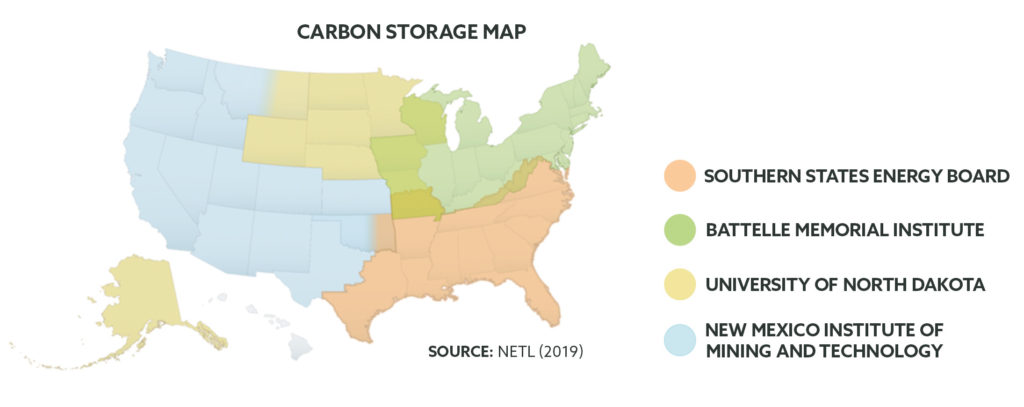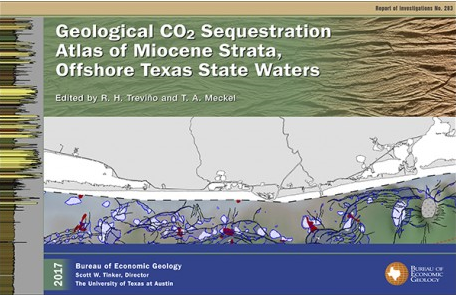SECARB-USA

10/1/2019 to 9/30/2022
The goal of the “Southeast Regional CO₂ Utilization and Storage Acceleration Partnership” (SECARB-USA) project is to help the United States meet its need for secure, affordable, and environmentally sound fossil energy supplies by utilizing the advancements made by the Regional Carbon Sequestration Partnership (RCSP) Initiative to continue to identify and address knowledge gaps.
The project goal is to achieve four primary research objectives: 1) address key technical challenges; 2) facilitate data collection, sharing and analysis; 3) assess transportation and distribution infrastructure; and 4) promote regional technology transfer and dissemination of knowledge.
The SECARB-USA regional initiative encompasses the states of Alabama, Arkansas, Florida, Georgia, Louisiana, Mississippi, North Carolina, South Carolina, Tennessee, Virginia, and portions of Kentucky, Missouri, Oklahoma, Texas, and West Virginia. The Southern States Energy Board is the award recipient.
View project partners here.
The partners will collaborate with DOE and the National Laboratories to accelerate CCUS technology development, to support the National Risk Assessment Partnership (NRAP) initiative and other modeling and simulation efforts that arise, and to participate in a new machine learning initiative.
The Bureau of Economic Geology (GCCC) at the University of Texas at Austin is one collaborator.

The following is a description of the subtasks that GCCC will undertake:
Subtask 2.1: Needs Assessment Framework for Storage Complexes
Description
The goal of this task is to conduct a region-wide assessment to identify data needed to advance storage projects at sites of relevance to stakeholders. This assessment will be tested against various potential storage sites and modified to include site-specific issues, such as surface or pore space rights. Specifically, to define a checklist of geotechnical components that a project developer may need and link them to stages of a project. The content in development is:
1) a review of previous work on characterization of storage suitability
2) permitting and accreditation requirements
3) consideration of project decision points
4) parameters that might be considered to evaluate a site and move to the next decision point
Results
During the second quarter, GCCC identified three stages of carbon storage project development: 1) feasibility assessment, required to demonstrate that full chain CCS is possible considering variables such as volume of CO2 to be captured and transported distances to storage; 2) site characterization, with sufficient detail about the geology and engineered modifications (past operations and existing well penetrations) to be used as input into initial fluid flow models of plume evolution, such that it can be used to lease storage rights and plan needed surface access; and 3) permitting. Parameters that are being considered to evaluate a site and move to the next decision point are:
• Storage Complex Injectivity Data Needs
• Storage Complex Capacity (dynamic/static) Data Needs
• Confining System/Seal Quality
• EOR Investment Decision Data Needs (as part of Stacked Storage)
• Induced Seismicity Data Needs (including basement faulting, stress state)
• Legacy Well Integrity Evaluation Data Needs
• Surface Land Use and Ownership Data Needs
Subtask 2.2: Expanded Regional Characterization (GCCC limited activity)
Description
This subtask expands and enhances the regional characterization effort for basins and potential stacked and single-zone storage complexes, primarily by utilizing legacy data, to further reduce uncertainties in reservoir and confining properties, as well as uncertainties in geologic structure, including basement faulting and stress state.
Subtask 2.3: Optimization, Containment, Verification Strategies Update and Application (GCCC limited activity)
Description
The goal of this subtask is to update and evaluate improvements in previously investigated tools and technologies for optimization of storage efficiencies, storage containment assurance, CO2 plume movement, and verification of storage in the storage complexes for the region. The Partners will consider application of these tools to high permeability reservoirs, selected unconventional complexes and stacked and single-zone storage complexes.
Subtask 2.4: Risk Needs for 2025 Commercial Deployment (GCCC limited activity)
Description
The goal of this subtask is to develop and validate risk assessment, management, and mitigation strategies for commercial-scale storage sites. The Recipient shall address two key aspects of Risk Assessment Strategies, including: 1) risks associated with commercial deployment of integrated capture, transportation and storage projects; and 2) risks associated with commercial-scale CO2 storage sites.
Task 3.0: Data Collection, Sharing, and Analyses
Description
The Recipient will engage with DOE/FE-funded researchers and national laboratories in the areas of ML, NRAP tools, and open collaboration to improve the understanding of safe and secure CO2 storage within the region.
Subtask 3.1: Data Management Plan
Description
The Data Management Plan (DMP) explains how data generated in the course of the work performed under this award will be shared and preserved or, when justified, explains why data sharing or preservation is not possible or scientifically appropriate.
Subtask 3.2: Analyze and Update Existing CO2 Source and Sink Databases (GCCC limited activity)
Description
The goal of this subtask is to re-evaluate and modify the existing CO2 source and sink databases with the latest available data. New CO2 sources not previously evaluated will be considered as prospects (e.g., biofuels and liquefied natural gas) and older, closing, and/or less economic facilities will be downgraded. Techniques will be assessed to downscale from wide-scale reservoir information at the basin-level to extract usable reservoir information on locations and characteristics (e.g., capacities, injection rates, and costs) for regional assessment using the SimCCS infrastructure optimization tool.
Subtask 3.3: Regional Assessment Toolset(s) Validation (GCCC limited activity)
Description
The Recipient will assist with the field validation of one or more risk assessment toolsets through: 1) collaborative research; 2) sharing of relevant datasets, information, and technical insights from field efforts; and 3) other modeling and simulation toolsets as they are developed.
Subtask 3.4: Machine Learning Initiative
Description
A key focus of this work is a next-generation assessment and decision support system for regional geological CO2 sinks. This research will include: visual data mining; database development and data governance; geographic information system (GIS) development, and data visualizations. An effective decision support system shall be developed that incorporates visual analytics and is stochastic (i.e., probabilistic) and heuristic (i.e., includes ML capability). This system will be used to examine and visually explore interrelationships among prospective CO2 sinks and seals, assess geologic and technical risk, and evaluate options for source-sink matching and transportation fairways.
Task 4.0: Regional Infrastructure
Description
This subtask will evaluate the regional needs and challenges for the development of a safe and environmentally sound CO2 transport infrastructure. This infrastructure would transport CO2 captured from power generating plants and/or industrial sources and distribute it to oil fields for associated storage in EOR operations, saline storage, and/or other suitable storage sites. The data readiness evaluation methodology will be applied to a statistically significant number of storage complexes. The study will assess how much data are available, with the goal being to develop a portfolio illustrating order-of-magnitude investments needed to advance toward a commercial site that is ready for CO2 injection. The subtask will prepare an assessment of the location and socioeconomic impacts of potential CCUS projects within the region and develop supportive business cases for regional CCUS development.
Subtask 4.1: Infrastructure Assessment (GCCC limited activity)
Description
The region contains existing CO2 transportation infrastructure due to the ongoing CO2-EOR operations. This subtask will leverage this knowledge, as well as the understanding of more recent transportation expansion projects, such as the Green Pipeline, to gain an understanding of how regional infrastructure development could occur. A techno-economic analysis of infrastructure buildout scenarios to identify optimal/feasible source-sink matching networks will be conducted. A summary of sub-basin prospective areas will highlight where investments in CCUS infrastructure could incentivize commercial deployment by 2025.
Subtask 4.2: Regional Site Readiness
Description
The Recipient will develop a site readiness evaluation methodology for the region. The results from the Needs Assessment developed in Subtask 2.1 will be leveraged to provide input into determining the site’s data quality. Numerical assessments and the application of the ML algorithms developed under Subtask 3.4 will be utilized and cross-checked and used to develop a valuation to understand the relative costs an under-prepared storage complex may require to achieve readiness as compared to a CO2-ready site.
Subtask 4.3: Socioeconomic Impacts of CCUS and Workforce Readiness (GCCC limited activity)
Description
This subtask will prepare a regional and state-scale assessment of the socioeconomic impacts of the identified potential CCUS projects. Using industry and regionally specific data, the subtask will develop valuations for each project, in addition to determining the jobs created. The assessment also will indicate if the region can technically support large-scale, commercial infrastructure development by including a review of the regional workforce’s capabilities. If a workforce with the required skills is not readily available, or if the technology is so new that a trained workforce does not yet exist, the Recipient will prepare a framework detailing how the needed workforce could be developed.
Subtask 4.4: Identification of Potential New CCUS Projects (GCCC limited activity)
Description
Partners will review and tailor existing commercialization plans that address CO2 storage in saline reservoirs, associated storage with EOR, storage in coal bed methane formations and storage with utilization in shale formations. State agency and trade association news releases, corporate announcement, and other sources of information will be used to identify potential projects and to contact project developers who are contemplating commercial CO2 projects. Potential project developers will be made aware of the SECARB-USA project.
Task 5.0: Regional Technology Transfer (GCCC limited activity)
Description
The subtask shall identify and engage a vast stakeholder group and prepare a Stakeholder Engagement Plan (SEP) to guide the regional knowledge dissemination and technology transfer strategy. The partners will demonstrate leadership in the global effort for deployment of CCUS by promoting regional technology transfer and dissemination of knowledge gained through the RCSPs and other projects worldwide to reduce risk and increase certainty for future carbon storage projects.
Subtask 5.1 Stakeholder Engagement Plan
Description
This subtask will expand its existing CCUS stakeholder group to provide the diversity of backgrounds, knowledge, and skills necessary to achieve the research objectives. The subtask will seek stakeholder and public feedback and report findings in periodic progress reports, which will be vital to refining and informing the future technical direction of DOE-funded work.
Subtask 5.2: Non-Technical Challenges to CCUS Deployment
Description
This subtask will define and identify non-technical challenges to CCUS deployment and facilitate and inform regional efforts to address them. The subtask will examine the region’s federal and state policy and regulatory frameworks related to CCUS deployment.
Subtask 5.3: CCUS Business Cases Under New and Existing Tax Policies
Description
This subtask will examine new and existing tax policies related to CCUS technology deployment. These findings will be applied to the identification and development of business case options and strategies, as well as other pathways, that support tax policy success.
Subtask 5.4: CCUS Educational Series
Description
The Recipient shall actively coordinate and participate in educational opportunities focused on reducing risks and eliminating technical and non-technical uncertainties surrounding CCUS deployment.
Subtask 5.5: Technology Transfer and Knowledge Dissemination
Description
This subtask will host partner, industry network, and stakeholder meetings to share project findings and results, identify knowledge gaps, and propose and consider the viability of specific solutions for closing the gaps. This includes communicating project findings and results with other DOE-funded researchers and the international community through annual project review meetings and other forums.
Last Updated: June 16, 2021



